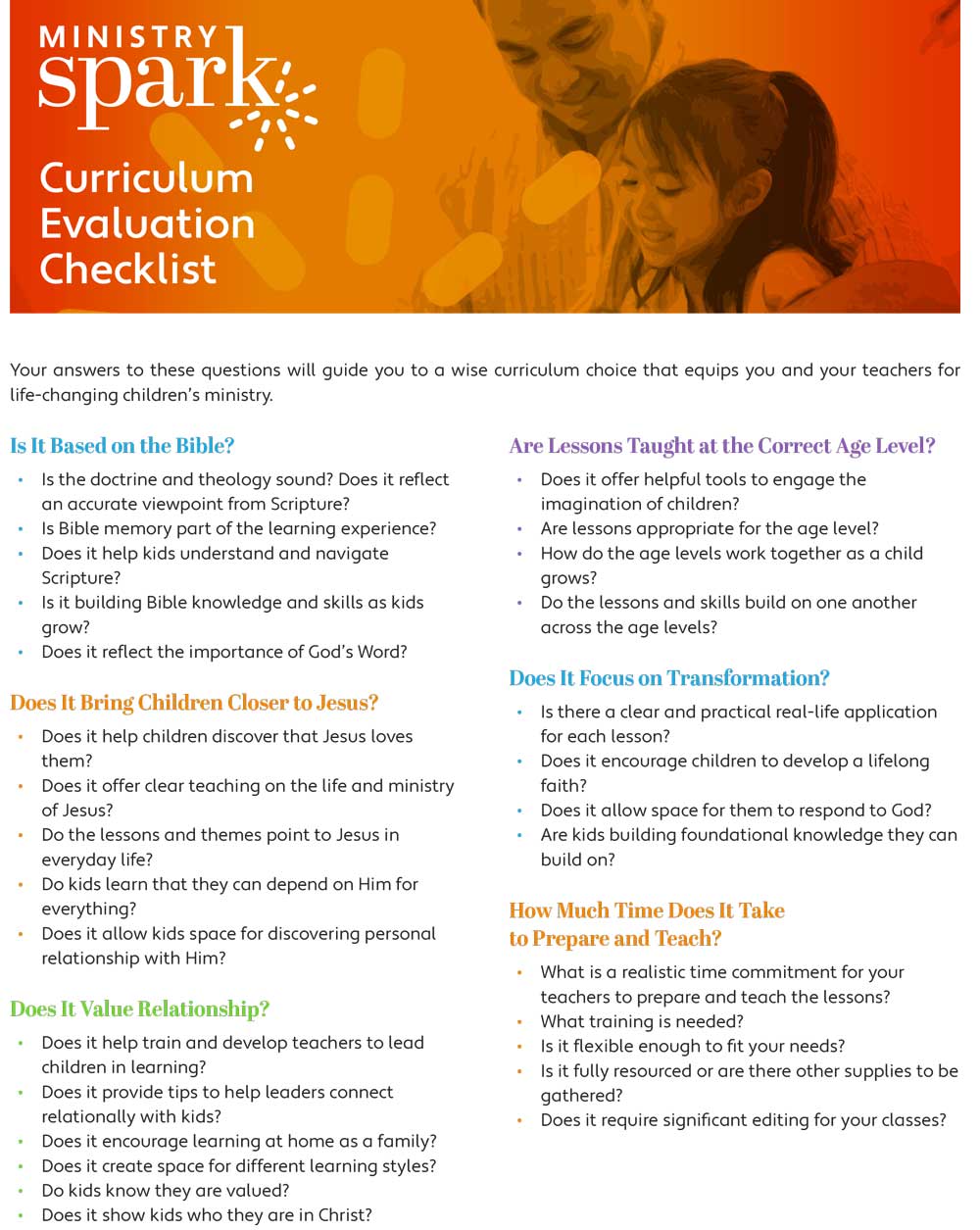This article was transcribed from portions of the Ministry Spark webinar: How to Choose Children’s Ministry Curriculum. You can watch the full webinar here.
I could talk all day about children’s ministry curriculum. It’s such an important topic in children’s ministry. Now, is there a perfect curriculum? There is no perfect curriculum, and every curriculum is not made for your specific people and your specific kids and volunteers in your church setting. So, it is going to take some editing and customization to fit your church. But if you start with the right bones and the right structure, it’ll release a lot of the pressure and the burden from you, and free you up to do ministry better.
No curriculum can disciple your kids. You disciple your kids because a disciple is the one who creates more disciples and invites them into that relationship with Jesus. So, the most important thing to remember is that curriculum is a tool and a framework. It is a structure that carries us while we are doing the relational work of ministry, and the right curriculum can free us up to really invest in our people and do the work of ministry. So, it is important to find the right fit for your specific church.
Curriculum allows kids to encounter and experience God, to worship and respond to Him, and it helps kids discover biblical truth. When you purchase a curriculum and adjust it to fit your text, it frees you up to do the real work of ministry. And that is pouring into your people. It really gives such a joy and freedom that allows God to work in our ministry. My personal ministry began to thrive once I chose the right curriculum.

Curriculum is a structure that carries us while we are doing the relational work of ministry, and the right curriculum can free us up to really invest in our people and do the work of ministry.
Choosing the Right Children’s Ministry Curriculum
Know Your Destination
That’s what we want for you. We want to know where we’re going, what we want our kids to know, and where we’d like them to be spiritually.
Having that destination and clear vision in your mind is one of the most important things you can do for your church before you choose your curriculum. What are the spiritual goals you have for the kids in your ministry? What are the milestones? Ask yourself how the curriculum aligns with your church’s mission and vision. Ask what outcome you are looking for?
And most importantly, as you begin, ask the Holy Spirit to lead you and help you discern as you’re choosing curriculum.
Utilize Your Team
As you go through this process, be sure to bring your team alongside you, gather research, and get feedback from people.
A year and a half ago, David C Cook did a survey for children’s ministry leaders asking all kinds of fun questions. Questions like: What do you want in a children’s ministry curriculum? How do you discover curriculum? How do you choose a curriculum? What is most important to you? What is not important to you in your curriculum? It’s a really interesting study, and we learned a lot of insights.
One of the things I thought was interesting was that the size of the church determines the various ways in which we choose and use our curriculum. What a church of 20 kids is going to need from a curriculum is different from a church that might have 500 kids.

Curriculum Evaluation Checklist

Curriculum Evaluation Checklist

Curriculum Evaluation Checklist
Align with What’s Important
Look at the specific needs of the people in your church ask what’s important to your church.
- Who is in your church? Look at your demographics, your audience, the needs of the kids and families.
- Consider your volunteers. Where they are spiritually. Do they come from a highly “churched” background or are they new to the faith?
- Look at the mission and vision for your kids and families.
Earlier this year at CPC, we had an interactive experience where people got to go through and answer certain questions about their children’s ministry. These questions helped them discover what curriculum might be a good fit for their church. And one of the questions was, what is most important in your ministry?
As people were going through the maze, they answered most of the questions very quickly. Then when they got to this one, they would pause. It caused them to think deeply about their mission is and how it aligns with what they are teaching. So, think about that question and consider what is most important.
Think Critically
Evaluate all kinds of different curriculum lines, gather samples, and look at the scope and sequence for them. Is it random? Does it make sense? Is it balanced? Are kids getting to see a full picture of the Bible and how it’s all connected? And are they getting the gospel and Jesus?
If you possibly can, teach the sample lessons in your children’s ministry—that’s such a great way to get a good feel for a curriculum.
Don’t simply think that simply because it’s published that it is going to be biblically accurate and theologically sound. I have seen some things that just weren’t a good fit for my church’s theology or my understanding of the Bible. And so really look at the curriculum and think critically about what it’s saying and what it’s teaching, and how it’s teaching the Word of God.
God’s Word as Authority
And just remember the responsibility that we have when we teach kids the Word of God. It’s so important that we take that seriously and teach the Bible as it’s meant to be taught.
Not taking the Bible as God intended and twisting it to make it more entertaining or more fun for kids, or to make it fit what we want it to say, is not okay. We want the Bible to speak the text, to speak for itself within the context of what it was meant to say. And so, as you’re looking at the lessons, read the Bible stories in Scripture against the lesson, and look at how they’re taught and what they teach us about God. Consider the vision of the curriculum, the philosophy, and the values.
Remember the responsibility that we have when we teach kids the Word of God.
Go see it in action. If you can, visit a church that’s using the curriculum you’re evaluating (just ask their children’s pastor ahead of time). You can learn a lot quickly if you can see what their Sundays look like and talk with the volunteers and the children’s pastors and kids.
And then, most importantly before you choose a curriculum, ask yourself: does it draw kids closer to Jesus and allow them to experience Him and connect with Him? Is it discipleship-, gospel-, and Bible-centered?
Discover more on choosing and implementing children’s ministry curriculum by watching the full webinar here.
- Curriculum Feedback Survey
Want to know how families and volunteers feel about your ministry and the curriculum you use? Gather feedback from those in your ministry using this simple survey. Download it now! - Curriculum Evaluation Checklist
Need help evaluating curriculum? Follow the questions to a wise curriculum choice that equips you and your teachers for life-changing children’s ministry.
Grab this free checklist and evaluate curriculum like a champ!












